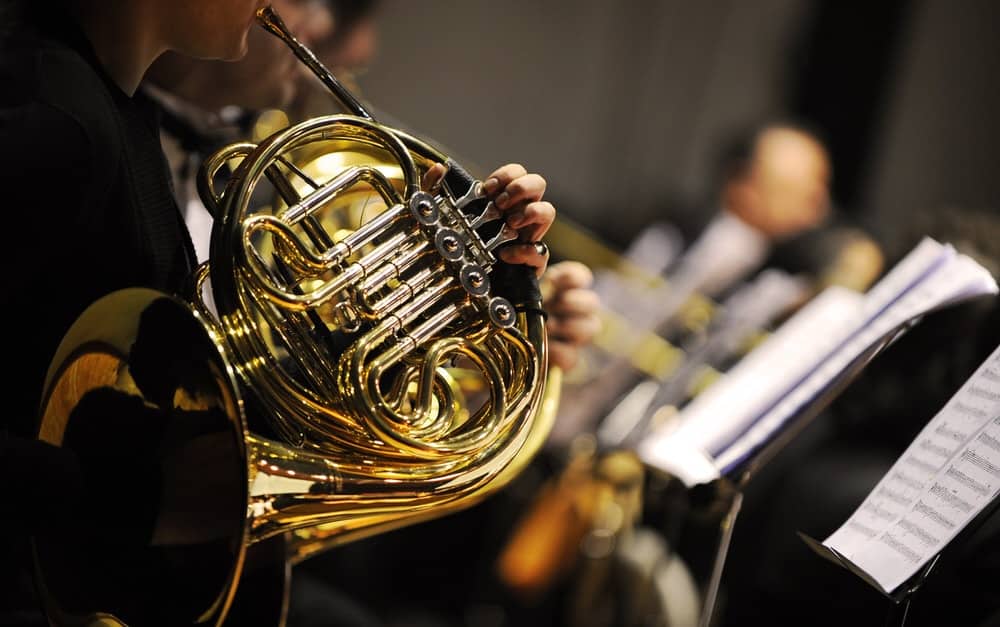French Horn Learning Methods
The best way to learn the French Horn
In our collection, ‘Beginner’s Guide To Learning The French Horn,’ this special bit shows how to pick the best way for you to learn the horn, considering your own unique situation.

Primary ways for French Horn Learning Methods
All people learn in different ways. A lot of people can remember phone numbers instantly, while other people may not even have the capacity to read. We’re all special and unique. It’s due to this that we can confidently point out that there isn’t one ideal way of learning a musical instrument.
We have four distinct types of learning. They are:
- Traditional, face-to-face, one-to-one learning
- Traditional, face-to-face, group lessons
- Video Tutorials
- Apps
If you’re a beginner or have been playing for years, one of those four options will be perfect for you. It’s just a matter of finding out which be is most suitable.

Traditional, face-to-face, one-to-one lessons
Hands down, the best way to learn the horn is one to one with a private teacher. Thousands of professional players and music students supplement their income from playing with private teaching, and there are many dedicated musicians who concentrate solely on teaching out there too. Often players who are especially interested in teaching will talk passionately about it in online profiles on teaching websites, as well as their playing experience, so this is something to look out for.
Always have a trial lesson – you want a teacher who teaches in a way that speaks to you and who you trust and get on with. Even at music college, not all students click with all teachers – so as a beginner, you have the same right (and need!) to choose the correct teacher for you. And remember being a fantastic player doesn’t necessarily correlate with the ability to teach beginners! So don’t let somebody’s playing reputation blind you as to whether or not they’re the right teacher for you.
As a beginner, you’ll probably want a half-hour lesson or at most 45 minutes. You won’t have a lot of stamina for a start, and will probably be focusing on just a few big things, which suit a shorter length.
If you’re worried about the amount of money this option costs, one option is to opt for a teacher who is a student or recent graduate as they often charge cheaper rates than seasoned professionals and teach really well (again, being a fantastic player doesn’t equal being an amazing teacher of beginners). But you do want somebody who has studied music either way!
A lot of professional musicians teach in schools, plus some very dedicated and talented individuals who’ve chosen to focus on teaching. Rates in school are often cheaper so this can be a chance for children to learn from someone great at a reduced price.
Generally, as the horn has some specific things (eg the right-hand position, being in F, closer-together notes than most other brass instruments, some different fingerings) I would advise you to check if a school teacher is a horn player (unless the school has a particularly flourishing brass department and several horn players already, in which case the teacher, horn player or not, is probably quite inspiring).

PROS
- Personalised feedback
- Lessons Adapted To Your Style Of Learning
- The Most Efficient Way Of Learning
- Can Be The Most Inspiring Option
CONS
- Expensive
- Difficult Scheduling
- Finding Right Teacher Is Difficult
- Requires You To Travel
Traditional, face-to-face, Group lessons

Some schools offer cheaper lessons in pairs or groups. But here the cost can come with a price of another kind – while you still get a real-life teacher, your learning can only go at the pace of the group. A lot of the time often gets spent on just getting everyone playing the same note, and time for individual attention is limited – so often things like posture don’t get covered, and there’s not loads of time to fix complex problems. Also, students are very rarely perfectly paired – there’s normally a weaker and a stronger one, which means often one is left behind and one is bored.
That said, there can be a lot of fun in a group dynamic, and some children enjoy doing it with their friends. I started learning in a group that was one trumpet, one trombone and one horn (a very extreme version of group lessons) and while I wouldn’t recommend that to anyone, I do play the horn for a living today so it wasn’t a complete death sentence.
Again, as above in the “lessons in schools” section, you ideally want a horn teacher and you definitely want your child to be having lessons with other horn players (so not a mix of different instruments!)
PROS
- Personalised feedback
- Can Be Fun Learning In A Group
- Cheaper Than One-2-One Lessons
CONS
- Difficult Scheduling
- Limited Choice Of Teacher
- You'll Learn At The Speed Of The Group
- Sharing The Teacher With Others
- Requires You To Travel
Video Tutorials
Free Courses

YouTube is definitely the biggest source of video lessons across the world. There is absolutely no more effective place than YouTube to uncover instructional content for French horn. Due to the sheer level of alternatives on the platform, it’s out of the question to review them all.
Like the majority of mass appeal platforms, 95% of the content is total garbage, with the other 5% no cost gold dust. Discovering that 5%, however, is certainly tricky!
Using videos can be an OK supplement to real-life lessons. Jaime Jamison has produced some videos that are pretty sound and might help you with the basics but I would advise using them between lessons to help you recap and help you motivate yourself rather than using them as your sole way to learn.
If you don’t wish to shell out money and are prepared to devote enough time while seeking for top quality content that drives you, then there is no superior place.
Paid Courses

You will find 100’s of paid French horn training courses online. Yet again, like YouTube, it’s unattainable to evaluate every one of them. Suffice to say, the most widely used platforms are:
Udemy is popular the world over for online learning in thousands of different disciplines. It can provide beginner, intermediate and advanced bassoon tuition, with an average cost of approximately £49.99 for a course of lessons.
PROS
- Low Cost or Free
- Huge Amount of Content
- Learn Whenever You Want
- No Travelling To Lessons
- Great For Popular Material
CONS
- So Much Choice It's Difficult To Find Great Content
- Quality of Content Is Questionable
- Not Great For Classical Playing
About the Author
Anna Drysdale
I’m Anna and I play the horn. My work takes me anywhere from playing Bach in Germany to the music of Prince at the Royal Albert Hall, working with orchestras like Scottish Chamber Orchestra, London Contemporary Orchestra and the BBC Philharmonic. I attended the Royal College of Music and Royal Academy of Music in London, as well as studying historical horn in Amsterdam; I’ve always had strong ties to Europe (as a massive foodie as well as a musician…) and can’t wait to get back to travelling for music again!
Other posts by this author
Zoom Lessons

If you’re looking for that one-to-one setup, but don’t want to trek around to a teachers house every week, then online lessons can work really well.
There are A LOT of companies out there that do lessons over Zoom, so you have to be ultra careful the quality is up to scratch. But the service we have found that has consistently great feedback is www.lessonwithyou.com. We like that they offer a half-hour lesson completely for free so you can try out the service and that they offer flexible scheduling with no contracts. They have teachers from Julliard, Berkeley, and Johns Hopkins – so the standard is high. Lastly, we LOVE that they don’t as for your credit card details for the trial lesson.

French Horn Apps

We all understand best when the training is customized to our own personal requirements. Apps really are a hybrid between conventional video tutorials and a real-world instructor. They fine-tune their training based upon your response to the software. Due to this, if you aren’t in a position to have in-person lessons, we would always recommend dedicated apps over generic YouTube video tutorials. There are many, many apps to choose from.
Also, there aren’t really any apps targeted at learning the horn. But there are some more general ones that can supplement your learning and help out.
Tuner
As a teacher myself, one of the big things I find with beginners is they don’t retain the right notes in their head week to week, which makes practice hard! At the beginning on the horn, a lot of notes share the same fingerings, so there’s less to keep them apart in the minds of beginners and it can be a bit abstract.
A tuner can be really useful to help you check the notes you’re playing – if you can hear a note you can generally pitch it much better, so if you play the note in the tuner app and then check it on your instrument that should get you on the right track.
Recorder
Another useful thing to do is to ask your teacher to record pieces or scales on your phone so that you can hear what they should sound like during your practice time – or even play along. Most phones have a built-in voice memo recorder which will be good enough!
PROS
- Best Cost Effective/Quality Ratio
- Can React To Your Level Of Learning
- Great For Popular Material
- No Travelling To Lessons
CONS
- No Personal Feedback On Your Playing
- Not Great For Classical Playing
French Horn Learning Methods - Summary
Learning how to play the French Horn can be tricky at times as the resources available might not fit the student’s needs. It’s always good to seek lessons from professionals as it will provide you with quality training.
Obtain Access To All Kinds Of Amusing Musical Things
Did you miss the opportunity last Friday? It only happens once a week, and unless you’re signed up, you’ll not find out about the incredible items I’ve uncovered for you this week.
Every Friday, I’ll provide you with a brief email in order to treat you to a handful of the excellent things that I’ve recently found out.
Songs. Performers. Cool gadgets. Instruments.
Touring the planet as a musician means I get to experience things you wouldn’t believe, and revealing it with you makes a lovely end to the week. Register totally free below.
Read the next post in this series:




